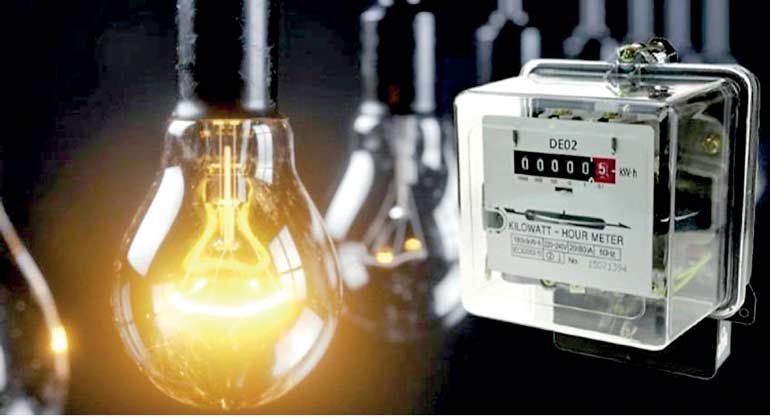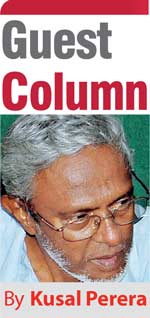Wednesday Feb 18, 2026
Wednesday Feb 18, 2026
Friday, 27 October 2023 00:10 - - {{hitsCtrl.values.hits}}

This decision by the PUCSL to approve the tariff increase of 18% from 20 July as with all previous increases are illegal and the CEB therefore has no legal binding to implement any increase henceforth
 The Public Utilities Commission of Sri Lanka (PUCSL) has for the third time in 14 months approved an electricity tariff hike by 18%, effective from 20 October. Whatever calculations and reasons the CEB and the PUCSL provide in justifying this third tariff hike, are only in relation to cost which means CEB expenses, never given in detail. For the consumer, my rough calculations show a cumulative increase in tariff of around 300% since August 2022, with one increase topping the other. The first in 2022 August being 75%, the next in 2023 February being 65% on the tariff increased by 75% and now 18% over the previous increase. PUCSL would justify this 18% increase by saying they did not allow the 22% increase the CEB wanted.
The Public Utilities Commission of Sri Lanka (PUCSL) has for the third time in 14 months approved an electricity tariff hike by 18%, effective from 20 October. Whatever calculations and reasons the CEB and the PUCSL provide in justifying this third tariff hike, are only in relation to cost which means CEB expenses, never given in detail. For the consumer, my rough calculations show a cumulative increase in tariff of around 300% since August 2022, with one increase topping the other. The first in 2022 August being 75%, the next in 2023 February being 65% on the tariff increased by 75% and now 18% over the previous increase. PUCSL would justify this 18% increase by saying they did not allow the 22% increase the CEB wanted.
My question is, “how legal are these increases that only consider unexplained CEB costs and not the consumer?” Does the Act that established the PUCSL with a mandate to decide tariff revisions requested by State owned public utility agencies, allow the PUCSL to decide on tariff revisions with the consumer wholly ignored? The PUCSL Act No. 35 of 2002 (https://www.pucsl.gov.lk/wp-content/uploads/2017/12/E-35-2002_E.pdf) in detailing “Objectives, Powers and Functions” of the Commission in Part IV lays down in Section 14(2) the Commission shall act in a manner as best calculated to (a) protect the interests of all consumers (c) promote efficiency in both the operations of and capital investment in public utilities (d) promote efficient allocation of resources and also (e) promote safety and service quality.
Let’s look into the provision of “protecting consumer interests”. Has the PUCSL protected, leave alone “promote the interest of all consumers” in deciding tariff increases during the past 14 months? What in fact are the fundamental interests of the consumer? First and foremost, it is affordability in the context of “living cost”. Next is the impact increases would have on his/her and family living costs. Also most importantly, its impact on his/her livelihood; self-employment or otherwise.
None of those aspects that affect the consumer has ever been considered. Massive tariff increases have been allowed without any attention paid at least to the UNESCO Report on Sri Lanka – 2022 that highlights “More than 5.7 million people, including 2.3 million children, require humanitarian assistance. Sri Lanka is among the top ten countries with the highest number of malnourished children and the numbers are expected to rise further.” Numbers are increasing with reported factory closures, throwing out thousands of employees from work.
According to the Census and Statistics Dept. “Labour Force Survey Quarterly Report – 2023 Q1” during the first quarter of this year 252,480 had lost employment compared to employment in the 2022 First Quarter. Top apparel manufacturers complain of excessive cost of production due to electricity tariff increases that make securing new orders difficult with other countries like Bangladesh and Vietnam offering cheaper rates.
The PUCSL cannot be ignorant of these socio economic issues the people are burdened with, to stick to CEB quoted expenditure estimates only. Since August 2022 three successive tariff increases approved on CEB requests to cover their costs, prove the PUCSL is violating its legally mandated social responsibility of “protecting the interests of all consumers”. If they did have any concerns for millions of people struggling to make ends meet in the worst economic crisis this country is crawling through and if they abided by their mandate to protect the interests of all consumers, they should have first and seriously looked into possibilities of “reducing CEB costs” instead of further increasing tariff for the third time.
Squaring off cost and income is not about merely increasing tariff, but is also about improving efficiency of service delivery and reducing cost. In all three occasions within the past 14 months when electricity tariff was increased, there was no attention and interest paid to improving efficiency and reducing CEB costs that includes incalculable waste, mega corruption, and callous inefficiency on the part of the CEB management the PUCSL has to take total responsibility for.
How can the PUCSL ever speak of “promoting efficiency” with trillions of rupees of uncollected consumer bills of politicians and businessmen left completely ignored? How can the PUCSL account for maintaining thousands as excess staff even the Minister of Power and Energy accepts there is, allow massive monthly overtime payments despite maintaining excess staff and also ignore outsourcing CEB services to private companies for undeclared fees and still approve tariff increases? That again violates their mandate to (c) promote efficiency in both the operations of and capital investment in public utilities and (d) promote efficient allocation of resources under Section 14(2) of the Act.
All these conscious violations of their mandate as provided for in the Act are being covered with requests for “Stakeholder consultation on the proposed 03rd electricity tariff revision 2023″. Oral submissions accordingly were fixed for 18 October 2023. The advertisement said from 4 to 18 October, written submissions would be accepted too. No one knows how many have submitted written proposals and suggestions and what they are.
I am still not told what they did with my proposals sent in on 4 October, except for the acknowledgement received. What I am expected to understand from their non-commitment on my requests is, the PUCSL in no way is willing to provide details of the CEB expenditure that would expose mega corruption, waste, inefficiency and undue privileges enjoyed by the top management and their wheeler dealers that are billed to the consumer as costs to be covered by tariff increases.
Thus, the decision to increase tariff by 18% was taken by PUCSL the day after oral presentations were accepted on 18 October. That again was a farce of a “stakeholder consultation” with those who were registered for oral presentation provided 10 minutes with no comments, queries and discussions allowed nor the PUCSL high command showing any interest in them. This was organised to show they were adhering to Section 17(b) that says the PUCSL shall “consult, to the extent the Commission considers appropriate, any person or group who or which may be affected, or likely to be affected, by the decisions of the Commission.”
In Sri Lanka no public consultation is practically possible without necessary documents provided in Sinhala and Tamil languages. With PUCSL, “relevant documents” for stakeholder consultations were made available “only” in English language, posted in their official website violating the Constitution that decides Sinhala and Tamil languages as the two official languages any State agency should communicate with. Thus, in no way was this a “public consultation”. It was only collecting proposals and suggestions, to leave on record the public was consulted.
Once again, the PUCSL Act was violated in many ways. The Act says, proceedings of public hearing shall be open to the public. This single day “hearing” was not. The Act says, “The minutes, including a record of the evidence given and a statement of all facts taken into consideration” in making a decision should be made public. But the decision to increase tariff was announced the following day, with no “minutes, including a record of the evidence given (submissions in this case) and a statement of all facts” ever made public.
It is anyone’s guess the decision to increase tariff from 20 October was pre-decided as directed by the Cabinet of Ministers. The letter PUCSL addressed to the Director General, CEB on 28 September, quotes the office of Cabinet of ministers as having “conveyed the decision of the Cabinet to the PUCSL, among other things, to; (i) urgently consider the submission by CEB based on the cost reflective tariff methodology and (ii) advance tariff revision scheduled for January 2024 to October 2023 to recover all costs.” This in fact was what the PUCSL did.
Summing up all the above, the PUCSL has violated the Constitution by refraining to provide necessary official documents in the two official languages Sinhala and Tamil, violated its own Act by ignoring the mandate to “promote interests of all consumers”, violated the provisions to make all minutes, statements and all other relevant information public and has also made a mockery of the announced stakeholder consultation, by refusing to engage even with the extremely limited stakeholder participants and open consultations for social dialogue and public engagement.
It is therefore my concerned assumption that this decision by the PUCSL to approve the tariff increase of 18% from 20 July as with all previous increases are illegal and the CEB therefore has no legal binding to implement any increase henceforth. By default, I say the consumers also have a moral and a legitimate right to demand PUCSL withdraw their decision on this tariff hike.